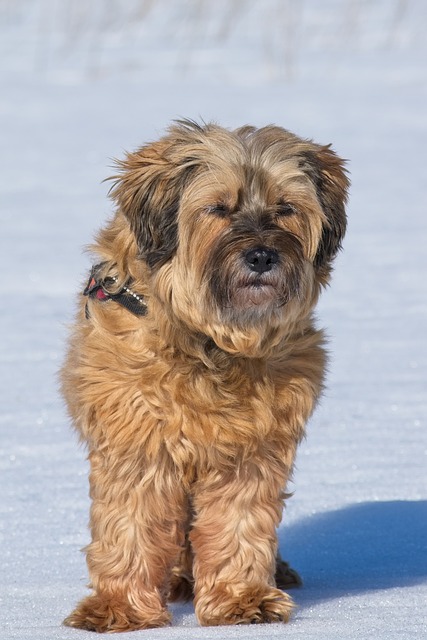


The Tibetan Terrier is a medium-sized, robust dog with a long, luxurious coat and a charming, affectionate personality. Despite its name, the Tibetan Terrier is not a true terrier; it was originally bred as a companion and working dog in the mountains of Tibet. Known for its friendly and playful nature, the Tibetan Terrier is an excellent family pet and is particularly suited for active families or individuals with the time to care for its grooming needs. They are also known for their agility and intelligence.
The Tibetan Terrier has a long and storied history dating back over a thousand years in Tibet. They were initially bred by Tibetan monks and nomads to be companions, watchdogs, and herders. The breed was highly valued, and it was believed to bring good luck. Tibetan Terriers were kept primarily by the monks of Tibetan monasteries and were never sold but instead given as gifts to those worthy of their companionship. This breed was virtually unknown outside of Tibet until the early 20th century when it was introduced to the Western world. The breed gained recognition by kennel clubs and was officially recognized by the American Kennel Club (AKC) in 1973.
The Tibetan Terrier is a medium-sized dog with a sturdy, square frame. They typically stand between 14 and 17 inches tall at the shoulder and weigh between 18 to 30 pounds. They have a distinctive long, thick, double coat that requires regular grooming to keep it from matting. The coat can be found in a variety of colors, including white, black, gold, and brindle, and often covers their eyes, giving them a unique, expressive appearance. Their face has a broad, rounded structure with a well-defined stop, and their tail is carried in a curl over their back. Despite their heavy coat, Tibetan Terriers are surprisingly agile and athletic.
The Tibetan Terrier is known for its affectionate, friendly, and calm demeanor. They are generally good with children and other pets, making them an excellent choice for family households. Tibetan Terriers are social dogs that enjoy spending time with their human family members and are often quite loyal to them. They are typically not aggressive but can be reserved or aloof with strangers, making them good watchdogs. Tibetan Terriers are intelligent, alert, and adaptable, with a natural curiosity and playful nature. Though they may be independent at times, they form strong bonds with their owners and enjoy being part of family activities.
Tibetan Terriers are moderately active dogs that enjoy regular exercise and mental stimulation. While they do not have the extreme energy levels of some working breeds, they still benefit from daily walks, playtime, and opportunities to explore. Tibetan Terriers are agile and enjoy engaging in activities like running, fetching, and agility training. They are well-suited for families with active lifestyles or individuals who enjoy outdoor activities. However, due to their long coats, it is important not to over-exercise them in hot weather, as they can overheat. Consistent but moderate activity is ideal for maintaining their physical and mental health.
The Tibetan Terrier is intelligent, which makes them relatively easy to train, though they can be somewhat independent or stubborn at times. Positive reinforcement methods, such as treats and praise, work best with this breed. Tibetan Terriers thrive on mental stimulation, so incorporating tricks, games, and obedience exercises into their routine is beneficial. Early socialization is important for helping them become well-rounded and friendly with strangers, other pets, and various environments. Proper socialization can prevent the breed from becoming overly reserved or timid. With early training and consistent guidance, Tibetan Terriers can excel in obedience and other activities.
The Tibetan Terrier is generally a healthy breed, though they are prone to some hereditary health issues. Common concerns include hip dysplasia, progressive retinal atrophy (PRA), cataracts, and certain skin conditions. Regular veterinary check-ups are essential to monitor their health, especially as they age. Tibetan Terriers are also prone to dental issues, so regular teeth cleaning is recommended. Their long, thick coat requires daily grooming to prevent tangles and mats. Bathing should be done periodically to maintain a clean coat, but over-bathing should be avoided as it can dry out their skin. Regular ear cleaning is necessary, as they are prone to ear infections due to their floppy ears.
The average lifespan of a Tibetan Terrier is between 12 to 15 years, with some individuals living even longer with proper care. Their longevity depends on factors like genetics, diet, exercise, and regular veterinary care. Like many breeds, maintaining a healthy weight, providing consistent mental and physical stimulation, and addressing any health issues early can contribute to a longer, healthier life.
© copyright Dog Compendium 2024 - 2026